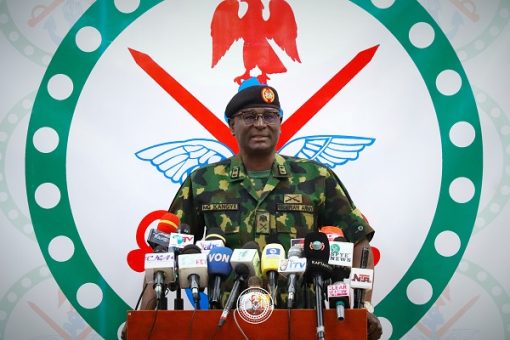The escalating violence plaguing several Nigerian states, notably Benue and Plateau, has prompted the Defence Headquarters to identify foreign herders infiltrating the country’s porous borders as the primary perpetrators. Major General Markus Kangye, the Director of Defence Media Operations, revealed during a press briefing that linguistic and physical characteristics distinguish these attackers from Nigerian nationals. He pointed out discernible differences in the Hausa dialect spoken by the attackers compared to the Hausa spoken within Nigeria, citing examples from Mali, the Central African Republic, and Ghana. Furthermore, physical attributes such as hair texture provide further evidence pointing to their foreign origin, with only the Shuwa Arabs of Borno State bearing a slight resemblance. This assertion follows escalating public outcry over the persistent herder-farmer conflicts that have resulted in widespread displacement and numerous fatalities, forcing thousands to seek refuge in Internally Displaced Persons (IDP) camps.
The influx of foreign herders has been linked to the exploitation of the ECOWAS protocol on free movement, as highlighted by Benue State Governor, Rev. Fr. Hyacinth Alia. While acknowledging the involvement of some Nigerian herders in these clashes, primarily due to encroachment on farmlands during cattle grazing, Major General Kangye underscored the disproportionate role of foreign infiltrators in the most violent and frequent attacks. This distinction underscores the urgent need for enhanced border security and inter-agency collaboration to effectively manage Nigeria’s vast and often porous borders, preventing the unchecked entry of these armed groups. This influx of foreign elements adds a complex layer to the already volatile security situation in the affected regions.
The military has reported significant successes in its ongoing operations against criminal elements across the country. Notably, Buhari Umar, a notorious arms dealer and kidnapping kingpin operating across Gombe, Bauchi, Plateau, and Kaduna states, was apprehended. This arrest represents a significant victory in the fight against organized crime and kidnapping, which have plagued these regions for an extended period. Furthermore, a five-man kidnapping syndicate operating in Nasarawa State was also dismantled, demonstrating the military’s commitment to disrupting criminal networks. The identification and arrest of these individuals contributes to restoring a sense of security within the affected communities.
In the volatile South-East region, military operations led to the neutralization of Nkwachi Eze, alias Onowu, a prominent gang leader responsible for numerous attacks and kidnappings. This successful operation represents a major blow to criminal activities in the region and contributes to the ongoing efforts to restore peace and stability. Beyond these specific operations, the military’s broader efforts throughout April yielded significant results, encompassing the rescue of 173 kidnapped victims and the surrender of over 204 terrorists and their families. These achievements underline the effectiveness of military operations in countering terrorism and organized crime, gradually weakening their hold on affected regions.
The military’s efforts extended beyond counter-terrorism and anti-kidnapping operations, encompassing a concerted crackdown on oil theft and illegal bunkering in the Niger Delta region. Operation Delta Safe, a military task force dedicated to securing the oil-rich region, reported significant successes in thwarting oil theft operations valued at over N1.93 billion within a single week. This involved the recovery of over one million litres of stolen crude oil, large quantities of illegally refined products, and the dismantling of 95 illegal refining sites. These operations not only disrupt the illicit trade but also protect vital national resources and revenue streams.
The multifaceted operations conducted by the military highlight its commitment to addressing the diverse security challenges facing Nigeria. These range from combating terrorism and kidnapping in the North and South-East to tackling economic sabotage through oil theft in the Niger Delta. The arrest of key figures in organized crime networks, the rescue of kidnap victims, the surrender of terrorists, and the disruption of illegal oil bunkering activities all contribute to fostering stability and security across the nation. The ongoing efforts underscore the crucial role of the military in maintaining peace and order while safeguarding the nation’s vital resources and its citizens. The Defence Headquarters continues to monitor and analyze the security landscape, adapting its strategies to effectively address evolving threats and ensure the safety and security of the Nigerian populace.














